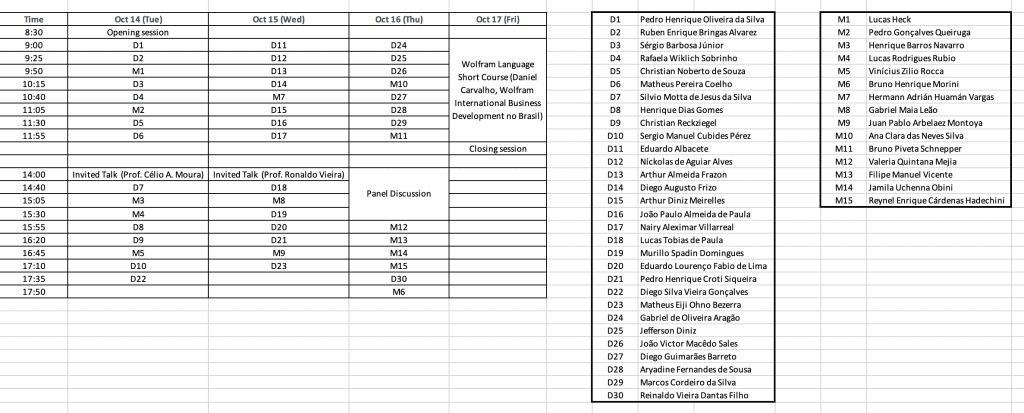UFABC Physics Week (UPW)
A UPW é um evento cientifico anual promovido pelo PPG-Física no qual a apresentação seminários de estudantes de Mestrado e Doutorado e compulsória. A apresentação é avaliada por uma banca de professores e pode substituir o relatório de atividades dos discentes.
Os objetivos da UPW incluem incentivar a prática do inglês nas atividades acadêmicas, criando um ambiente propício a internacionalização da Pós-Graduação em Física, parte ou a totalidade das atividades da UPW será conduzida em inglês.
- Discentes do mestrado devem apresentar slides em inglês, mas podem optar por apresentar e serem questionados pela banca em português.
- Discentes do doutorado devem apresentar slides em inglês, e deverão fazer sua apresentação, bem como interagir com a banca, neste idioma. Cada membro da banca deverá avaliar se o discente apresenta proficiência em inglês compatível com o esperado para um doutor em física. Discentes de doutorado considerados PROFICIENTES na UPW serão dispensados da apresentação de outros testes de proficiência, conforme previsto pelas Normas Internas, para conclusão de seu doutorado.
News: UPW 2025 Schedule Now Announced!
News: Registrations are now open for the short course on Wolfram Language (more information below)
UPW 2025 – Program
Start: October 14 (Tuesday) – End: October 17 (Friday)
Location: The student presentation sessions, as well as the opening session, closing session, invited talks, and the panel discussion, will take place in room A-114-0 (Block A).
Location of the Wolfram Language short course: To be defined.
Invited Talk: Searching for Beyond Standard Model Physics with Neutrinos – Prof. Célio Adrega de Moura Junior (UFABC)
New generation of neutrino experiments with high-intensity neutrino beams for precision measurements can explore physics beyond the standard model (BSM). The realm of BSM physics has been mostly sought at high-energy regimes at colliders. This kind of exploration in neutrino experiments will enable complementary measurements at lower energies. Large mass detectors with highly precise tracking and energy measurements, excellent timing resolution, and low energy thresholds will enable searches for BSM phenomena as never before. Therefore, it is conceivable that BSM topics in the next generation neutrino experiments could be the dominant physics topics in the foreseeable future. I will briefly discuss two selected BSM topics – nonstandard interactions and Lorentz invariance violation – summarizing their status and prospects for long baseline neutrino experiments.
Invited Talk: Chaotic orbital dynamics of extended bodies around black holes – Prof. Ronaldo Savioli Sumé Vieira (UFABC)
An extended test body in Newtonian gravity usually deviates from its corresponding point-particle motion: its center-of-mass trajectory is affected by its own internal structure, generating quite diverse phenomena. Therefore the body’s size may interfere in its orbital motion in the presence of a gravitational potential, sometimes becoming chaotic. Here we consider small test bodies with symmetries such that their spin are identically zero along their orbits. We show that small pulsating spheres may acquire chaotic behavior even in spherically symmetric gravitational fields due to a time-dependent term (arising from these finite-size effects) in the Hamiltonian governing their center-of-mass dynamics. In general relativity, by applying Dixon’s formalism to the test body and keeping symmetries such that the body’s spin remains identically zero, we extend these results to pulsating spheroids in Schwarzschild spacetime and also in a general class of black-hole spacetimes describing either Reissner-Nordström metric or spacetimes arising from modified (metric) theories of gravity. We also obtain conditions for chaotic orbital motion of pulsating stars around black holes. The overall picture is the ubiquity of chaos in these systems when the body is approaching the black hole, however small the pulsating body is.
Panel Discussion: International Year of Quantum Science and Technology – Celebrating a century of quantum innovations and exploring future visions for social transformation and global challenges
Recognizing the importance of quantum science and the need to raise broader awareness of its past and future impact, dozens of national scientific societies joined forces to support marking 100 years of quantum mechanics with a UN-declared international year. On June 7, 2024, the United Nations proclaimed 2025 as the International Year of Quantum Science and Technology (IYQ). According to the proclamation, this year-long global initiative will be carried out through activities at all levels aimed at increasing public awareness of the importance of quantum science and its applications.
As part of UPW 2025, we will host a panel discussion with the professors Ana Melva Champi Farfan, Carlos Augusto Mera Acosta, and Hans Marin Florez (all from UFABC), in a lively conversation on the topic, moderated by Prof. Breno Marques Gonçalves Teixeira (UFABC).
Short course: Research and code AI, ML, LLMs with Wolfram Language with Daniel Carvalho (Wolfram International Business Development no Brasil)
Explore the integration of artificial intelligence (AI), machine learning (ML), and large language models (LLMs) within the Wolfram Language, a powerful computational platform for innovative coding. We will delve into how Wolfram Language’s symbolic framework and built-in functions enable seamless development of AI-driven applications, from data preprocessing to deploying sophisticated ML models. Attendees will discover practical techniques for leveraging Wolfram’s advanced tools, such as neural network frameworks and natural language processing capabilities, to create intelligent, scalable solutions. The session will highlight real-world examples, showcasing how Wolfram Language simplifies complex tasks like pattern recognition, predictive modeling, and text generation with LLMs. Designed for students and researchers, this talk assumes basic programming knowledge and aims to inspire the next generation of computational thinkers to harness AI and ML creatively and efficiently using Wolfram Language’s unique ecosystem.
Registrations are now open for this short course: link
If the number of registrations exceeds the room’s capacity, priority will be given to the most recently enrolled students in the Graduate Program in Physics.
Registration deadline: September 22, 2025

